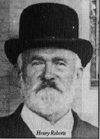
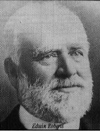

ROBERTS OF DEANSHANGER
For over 100 years the village of Deanshanger reverberated to the sound of the Britannia Ironworks, owned and managed by several generations of the Roberts family. The business was founded in 1821 by Richard Roberts, who apparently originated as a blacksmith. It was taken over in 1843 by his son John and then in 1857 by grandson Edwin. By this time there was a fully fledged foundry, and a labour force of about ten. Rapid expansion and a partnership between Edwin and his brother Henry, laid the foundations of an internationally known business with a reputation for innovation and sound engineering.
The ironworks was situated conveniently adjacent to the Buckingham Arm of the Grand Junction Canal, but deliveries and products arrived and departed by both road and canal, as well as vis the railway station and Wolverton, and for a short period using the tram itself. The company expanded rapidly and soon occupied a large site, having facilities ranging from carpentry and pattern shops, iron foundry, assembly, painting and offices for the managerial staff.


Over the years the company produced several hundred types of plough, and it is for this ubiquitous piece of agricultural equipment that the firm was mainly known. To complement the ploughs the company also produced a large selection of other implements - hoes, scarifiers, rollers, clod crushers, harrows, cultivators and horse rakes. Another of the main lines were a range of elevators retailing under the 'Premier' and 'Litelift' tradenames. The firm also had full wheelwrighting facilities and produced a range of carts and wagons.
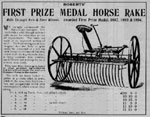
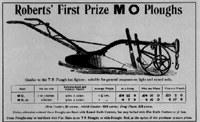
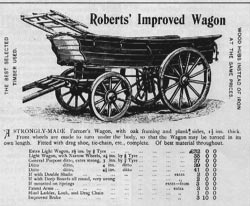
The Roberts name also came to prominence in the field of windpumps. Known by the 'Hercules' trademark, they were featured extensively on the firms letterheads. Waterwheels were produced and one has survived and is now operating at Milton Keynes Museum, amongst a large collection of artefacts emanating from the works in Deanshanger.
![]()